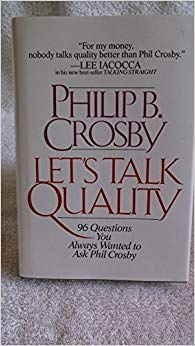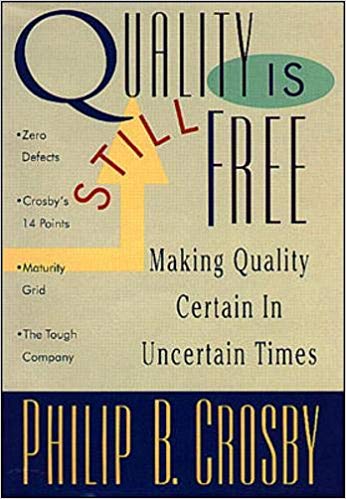Background
Philip Bayard Crosby was born on the 18th of June, 1926 in Wheeling, West Virginia, United States; the son of Edward and Mary (Campbell) Crosby. He had one brother, David.

1944
1636 National Rd, Wheeling, WV 26003, United States
Philip Bayard attended public schools in Wheeling. He graduated from Triadelphia High School in 1944.
1950
6000 Rockside Woods Blvd N, Independence, OH 44131, United States
Crosby went on to specialize in foot surgery, receiving a Doctor in Podiatric Medicine degree in 1950 from the Ohio College of Podiatry (now Kent State University College of Podiatric Medicine).
1989
Philip Crosby Associates, Inc. Board Of Directors, 1989
10900 Euclid Ave, Cleveland, OH 44106, United States
Philip Bayard Crosby attended Case Western Reserve University.
Philip Bayard Crosby
Philip Bayard Crosby






(Discusses common management problems and recommends techn...)
Discusses common management problems and recommends techniques for managers for improving the efficiency and productivity of a company.
https://www.amazon.com/gp/product/0070145113/ref=dbs_a_def_rwt_bibl_vppi_i1
1984

(Gives practical advice on motivating employees, improving...)
Gives practical advice on motivating employees, improving communication skills, reducing paperwork, setting a good example, and developing leadership qualities.
https://www.amazon.com/gp/product/0452259150/ref=dbs_a_def_rwt_bibl_vppi_i4
1986

(The author draws on his personal experience in management...)
The author draws on his personal experience in management, creating a fictional model company to demonstrate how five simple management techniques can improve employee morale, increase productivity, and create greater customer satisfaction.
https://www.amazon.com/gp/product/0070145334/ref=dbs_a_def_rwt_bibl_vppi_i7
1987

(Presented in a question-and-answer format, the advice of ...)
Presented in a question-and-answer format, the advice of a quality management expert provides help for assuring high-quality management.
https://www.amazon.com/gp/product/0070145652/ref=dbs_a_def_rwt_bibl_vppi_i13
1989

(Business McGraw-Hill is proud to present a book of 365 pe...)
Business McGraw-Hill is proud to present a book of 365 penetrating insights from one of the world's premier business authors. Philip B. Crosby's renowned quality guru has reached millions of managers through his bestselling books and his renowned Quality College.
https://www.amazon.com/gp/product/0070145253/ref=dbs_a_def_rwt_bibl_vppi_i6
1995

(Crosby evaluates the progress of his original quality man...)
Crosby evaluates the progress of his original quality management principles and includes his maturity grid for companies to use in assessing the successes and failures in their own organizations.
https://www.amazon.com/gp/product/0070145326/ref=dbs_a_def_rwt_bibl_vppi_i2
1996

(In this, his eleventh book, world-renowned consultant Phi...)
In this, his eleventh book, world-renowned consultant Philip Crosby offers readers a simple, yet ingenious method for assessing the skills of those they've been assigned to follow, as well as their own leadership abilities. Leaders, he says, come in five versions? Destructor, Procrastinator, Caretaker, Preparer, and Accomplisher. And by examining each of those character types in relation to his four Absolutes of Leadership, the author establishes a framework would-be leaders can use to build quality leadership skills of their own.
https://www.amazon.com/gp/product/0787909424/ref=dbs_a_def_rwt_bibl_vppi_i3
1996

(Philip Crosby has emerged as one of the century's greates...)
Philip Crosby has emerged as one of the century's greatest management thinkers. Now, in this autobiography, the person most responsible for the quality revolution in American business shares the ideas and insights he's gathered over the course of an eventful, forty-year career. A talented storyteller, Crosby recounts his years as vice president of ITT, his working relationship with the legendary Harold Geneen, and the launch and re-launch of his own consulting practice.
https://www.amazon.com/gp/product/0787947024/ref=dbs_a_def_rwt_bibl_vppi_i8
1999

(A leading spokesman for product quality offers advice on ...)
A leading spokesman for product quality offers advice on developing the critical organizational skills for successful, effective leadership, with special attention to the areas of finance, quality, and relationships.
https://www.amazon.com/gp/product/0070145679/ref=dbs_a_def_rwt_bibl_vppi_i10
1999
consultant philosopher author businessman
Philip Bayard Crosby was born on the 18th of June, 1926 in Wheeling, West Virginia, United States; the son of Edward and Mary (Campbell) Crosby. He had one brother, David.
Philip Bayard attended public schools in Wheeling. He graduated from Triadelphia High School in 1944. He studied pediatrics in his early years. A former student of what is now Case Western Reserve University, Crosby went on to specialize in foot surgery, receiving a Doctor in Podiatric Medicine degree in 1950 from the Ohio College of Podiatry (now Kent State University College of Podiatric Medicine).
Philip received several honorary degrees. In 1985, he got a Doctor of Laws degree from Rollins College in Winter Park, Florida, as well as from Wheeling University in 1986 and from University Findlay in 1991.
At the beginning of his career, Philip Bayard Crosby joined the Navy and became a hospital corpsman. Later, he was recalled to military service during the Korean conflict, this time he served as a Marine Medical Corpsman. After serving the navy, Philip Crosby gained extra income by working in a manufacturing plant as an assembly worker. He continued the job and became more experienced in assembly work and identified that businesses should better focus on doing things right the first time.
As a consequence, Philip Crosby learned by experience how to prevent problems in manufacturing plants. Since his talent was moreover demonstrated in the factory, in 1952, he went to work for the Crosley Corporation, in Richmond, Indiana, as a junior electronic test technician. He was asked to join the American Society for Quality Control, the Richmond section, and this is where his early concepts concerning quality began to form.
In 1955, Philip Bayard moved to South Bend in Indiana and joined Bendix Corporation as a reliability technician. Bendix and the U.S. Navy were developing and testing the TALOS missile. After two years he left to become a senior quality engineer for Martin Marietta Company (now Lockheed Martin) in Orlando, Florida. During his eight years with Martin Marietta, he developed his Zero Defects concepts, began writing articles for various journals, and started his speaking career.
In 1965, International Telephone and Telegraph (IT&T), hired him as a vice president in charge of corporate quality. During the fourteen years with IT&T, Crosby worked with many of the world's largest industrial and service companies. He began implementing his pragmatic management philosophy and found that it worked.
In 1979, he founded Philip Crosby Associates Inc., a consulting firm that advises such corporations as General Motors and Xerox on quality management with headquarters in Winter Park, Florida. In 1991, he sold Philip Crosby Associates to establish Career IV Inc., an organization dedicated to sharing quality control knowledge with future executives. In 1997, he purchased the assets of Philip Crosby Associates and established Philip Crosby Associates II Inc.
As an author, Philip Bayard Crosby published fourteen books, all of which were best sellers. His first book, Cutting the Cost of Quality, was written in 1966. He also wrote Quality Is Free in 1977, Quality without Tears: The Art of Hassle-Free Management in 1984, Running Things: The Art of Making Things Happen in 1986, The Absolutes of Leadership in 1996, The Reliable Organization in 1998, and Leading: The Art of Becoming an Executive in 1999.
Philip Bayard Crosby was particularly known as an influential author, consultant and business philosopher. His contributions to the field of quality have helped many organizations.
Crosby’s book, Quality is Free, has been credited with beginning the quality revolution in the United States and Europe. It has sold over 2.5 million copies and has been translated into 15 languages.
(The author draws on his personal experience in management...)
1987(In this, his eleventh book, world-renowned consultant Phi...)
1996(A leading spokesman for product quality offers advice on ...)
1999(Crosby evaluates the progress of his original quality man...)
1996(Gives practical advice on motivating employees, improving...)
1986(Presented in a question-and-answer format, the advice of ...)
1989(Discusses common management problems and recommends techn...)
1984(Business McGraw-Hill is proud to present a book of 365 pe...)
1995(A successful executive explains the techniques and strate...)
1972(Philip Crosby has emerged as one of the century's greates...)
1999Crosby defined quality as conformity to certain specifications set forth by management and not some vague concept of goodness. These specifications are not arbitrary either, they must be set according to customer needs and wants.
Quality, Crosby emphasized, is neither intangible nor immeasurable. It is a strategic imperative that can be quantified and put back to work to improve the bottom line. Acceptable quality or defect levels and traditional quality control measures represent evidence of failure rather than assurance of success. The emphasis, for Crosby, is on prevention, not inspection and cure. The goal is to meet requirements on time, first time and every time. He believes that the prime responsibility for poor quality lies with management, and that management sets the tone for the quality initiative from the top.
Crosby's approach to quality is unambiguous. In his view, good, bad, high and low quality are meaningless concepts, and the meaning of quality is conformance to requirements. Non-conforming products are ones that management has failed to specify or control. The cost of non-conformance equals the cost of not doing it right the first time, and not rooting out any defects in processes.
With the implementation of prevention, he tried to justify and verify his idea of "zero defects". Zero defects do not mean that people never make mistakes, but that companies should not begin with allowances or sub-standard targets with mistakes as an in-built expectation. Instead, work should be seen as a series of activities or processes, defined by clear requirements, carried out to produce identified outcomes. Systems that allow things to go wrong - so that those things have to be done again - can cost organizations between 20% and 35% of their revenues, in Crosby's estimation.
Quotations:
"Quality is the result of a carefully constructed cultural environment. It has to be the fabric of the organization, not part of the fabric".
"Making a wrong decision is understandable. Refusing to search continually for learning is not".
"Quality has to be caused, not controlled".
"In a true zero-defects approach, there are no unimportant items".
"The audience only pays attention as long as you know where you are going".
"Eliminating what is not wanted or needed is profitable in itself".
"Slowness to change usually means fear of the new".
"You have to lead people gently toward what they already know is right".
"Being convinced one knows the whole story is the surest way to fail".
"The great discoveries are usually obvious".
Philip Bayard Crosby was a member of the India Quality Foundation, House of Hope.
Philip Bayard Crosby was married twice. His first marriage was to Shirley Jones, but they divorced later. His second marriage was to Peggy Davis in 1984. They have three children, one son, and two daughters, Phillip Junior, Phylis, and Leyla.
